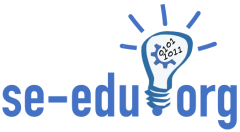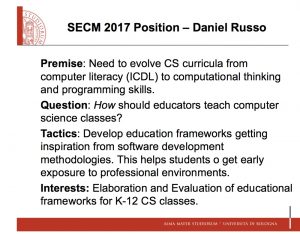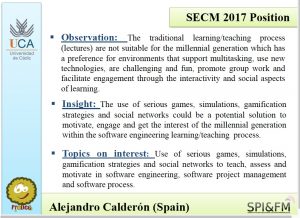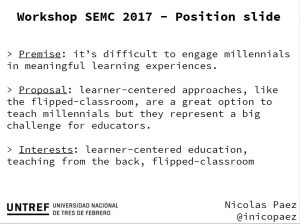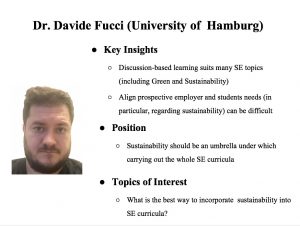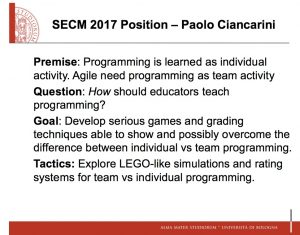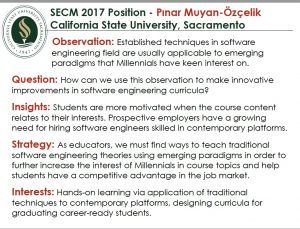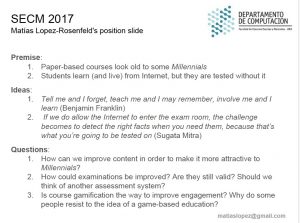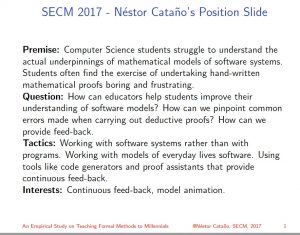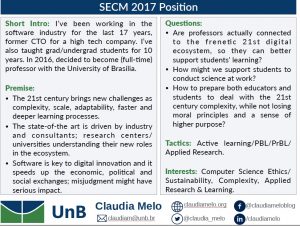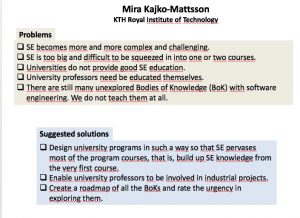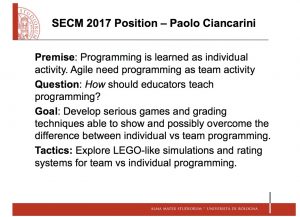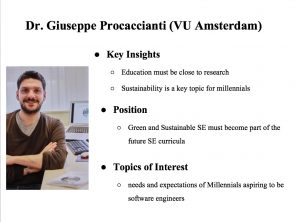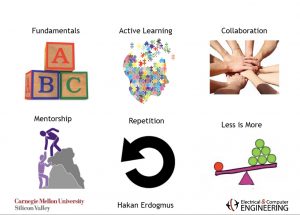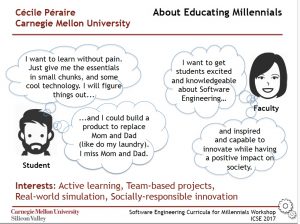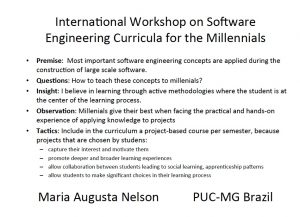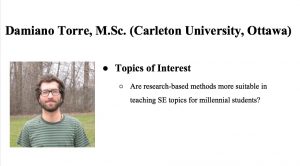The first workshop on Software Engineering Curricula for Millennials (SECM) was collocated with ICSE 2017 in Buenos Aires, Argentina. The full-day event took place on May 27 at the Pontificia Universidad Católica Argentina (UCA) with Diego Fontdevila as the featured keynote speaker. Cécile and I would like to thank you for sharing your insights with everyone and making this first gathering a success! The collective experience and knowledge of the group were truly impressive. I have posted snapshots from the workshop on the web site (thanks for sending your photos to me). Also many thanks to PC members for reviewing the submissions and Nico Paez for helping with the local logistics.
Find the list of papers and workshop agenda on the SECM web site. You’ll also find a list of attendees and position slides from participants.
Here is a summary of the day by Nico Paez.
Our twitter tag was: #secm2017
This beautiful artwork was created on the fly by Nayla Portas during Diego Fontdevila’s keynote. Great job!
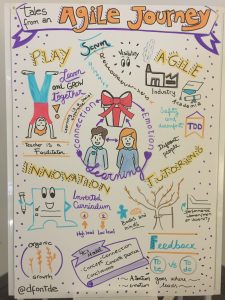
How shall we proceed next based on the action items collected at the end of the workshop? Some concrete suggestions were:
- Establish a communication channel – done (Google group SE-EDU )
- Refactor the workshop web site to get it ready for the next event and create a community web site for doing whatever we need to do in the interim – done (SECM 2017 is now served at subdomain secm2017.se-edu.org, and the domain se-edu.org points to this web site)
- Invite others who might be interested in joining to grow the community (need suggestions)
- Address a few of the high-priority topics that we did not get a chance to discuss at the workshop, perhaps via blogposts on this web site (more on this below)
- Change the name of the workshop series before it becomes legacy to something everybody likes and is a bit less pedantic (e.g., SE Education for Millennials)
- Create a draft agenda for next event (done thanks to Cécile, see this link)
- Form a committee and submit a proposal to ICSE 2018 (ASAP)
Here is a list of high-priority topics identified at the workshop that could be addressed by attendees via blogposts on this web site:
- Inverted curriculum (Nico P.)
- Scaling up flipped classroom
- Assessment and grading
- Team formation
- Teaching collaboration skills
- Maintaining student attention, motivation
- Replicating courses
- Active learning (Hakan, observations from a recent CMU Eberly Center workshop)
- Teaching skills / Book reviews (Diego, Nico P., perhaps a summary of classroom-tested strategies from the books mentioned at the workshop, including Teaching from the Back of the Room and Pedagogical Patterns)
- Teaching as Research (TAR, basically running classroom studies to measure effectiveness of teaching strategies, Hakan)
- Teaching ethics and sustainability in SE (Davide, Claudia)
- Sustainable/holistic learning (Juraj, based on his Yoga & Human Development experience. Here is the movie he has shared with us in an email)
Suggestions for other topics are always welcome!
Finally, here is a number of millennium traits validated by students who attended the workshop, assembled from her workshop notes by Cécile:
- Tech-savvy
- Want personalized experiences
- Lack team focus
- Do not like toy examples
- Need challenging goals
- Favor practice over theory
- Active learner
- Easily bored
- (Ineffective) Multi-taskers
- Want immediate feedback
- Super scared of failure (their goal is not to learn from failure 🙂
- Curious
- Discovery driven
- Socially aware
- Visually focused (maybe?)
These traits come from circumstances (internet, social media, etc.) versus personal characteristics.
